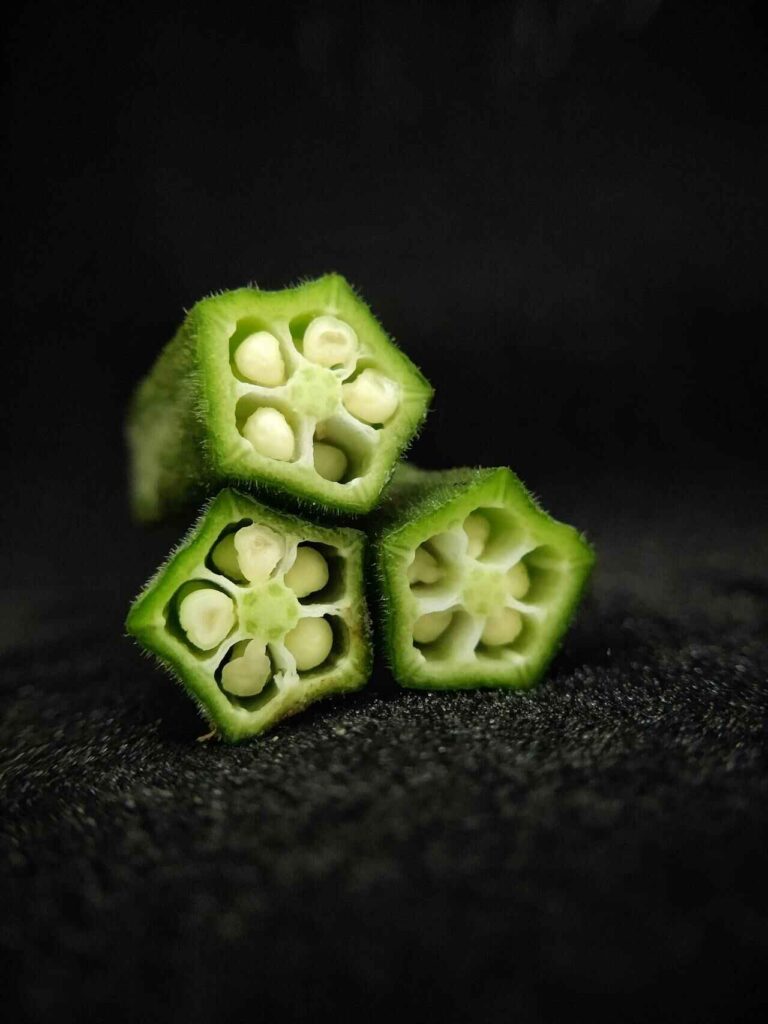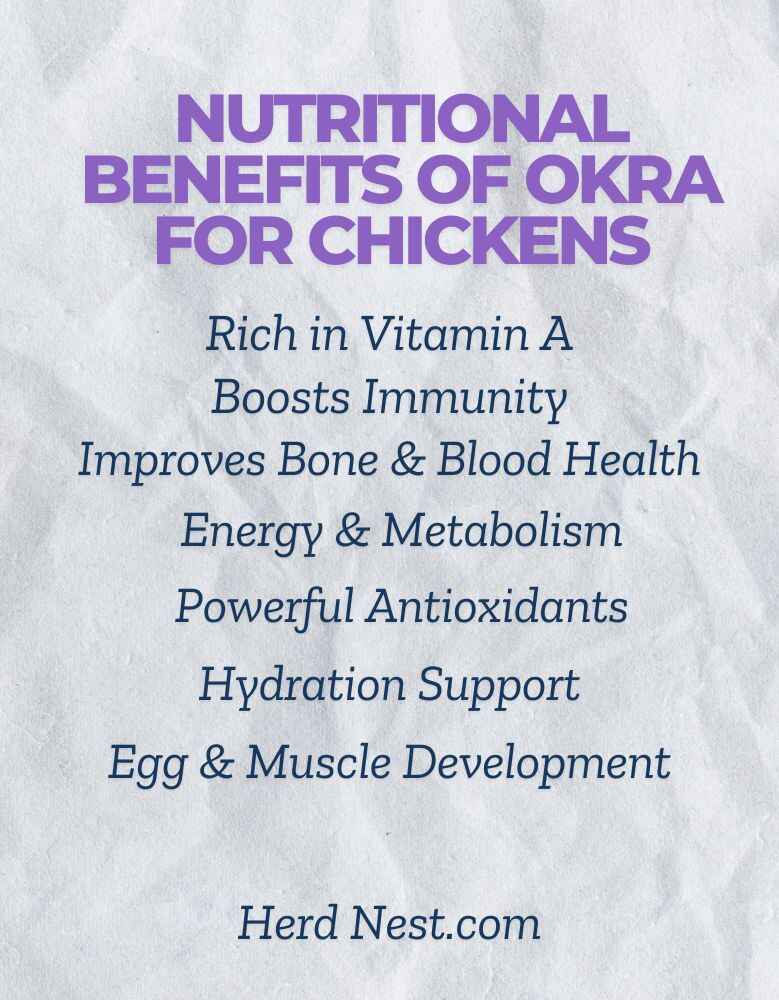As a backyard chicken keeper, I’ve often explored natural food options to enrich my flock’s diet. One interesting addition I’ve found is okra—a versatile vegetable packed with potential benefits. While it’s generally safe for chickens, there are important considerations to keep in mind.
Okra pods, leaves, stems, and even seeds can be nutritious supplements, but care is needed because they contain small amounts of solanine. This compound is harmless in tiny quantities but can be risky if overfed.
My poultry thrives on a mix of varied food sources, and incorporating items like eggplant, pears, or plums alongside okra has kept them healthy. The growing popularity of backyard keeping has encouraged many of us to seek creative yet informed feeding practices. By gradually introducing okra into their diet, you can make an educated decision that supports their health and growth.

Table of Contents
ToggleCan Chickens Eat Okra?
Okra is a nutritious and safe treat for chickens when fed in moderation. Packed with vitamins A, C, K, and B-complex, it boosts immunity, aids digestion, promotes bone health, and supports growth and egg production. Chickens can eat all parts of the okra plant—pods, seeds, leaves, tops, and stems—but care should be taken due to its small traces of solanine, which can be harmful in excess.
Whether served raw, cooked, frozen, or pickled, okra adds variety and nutritional value to their diet. Always feed clean, pesticide-free okra and introduce it gradually. As with any treat, it should complement—not replace—a balanced poultry feed.
Are Okra Plants Safe for Chickens?
While chickens love foraging in the backyard, they may encounter okra plants. Thankfully, these plants are generally safe, even though they contain traces of solanine, a toxic substance commonly found in nightshade and Solanaceae plants.
Some researchers classify okra under the genus Abelmoschus, part of the Malvaceae family, making it less dangerous. While solanine can cause joint pain, arthritis, and inflammation in humans and animals, the plant itself isn’t harmful unless consumed in large amounts.
If your chickens accidentally take a bite, there’s no need to worry—they should stay in good health without any problems.
Are Okra Leaves Good for Chickens?
Yes, okra leaves are safe for chickens to eat, unlike some other plants from the nightshade family. If you give them the leaves, they may try them, but don’t expect them to become their favorite. Okra leaves aren’t as tasty as other treats or feeds, so they’re more of an occasional option rather than a regular snack.
Are Okra Pods Safe for Chickens?
Okra pods act as a casing or wrapper that holds the seed in place, just beneath the skin of the vegetable. The good news is that these pods are completely edible and safe for your chickens.
There’s no need to remove them before feeding, which makes it a no-hassle addition to their diet. With their thin layer and soft texture, okra pods are an easy and nutritious treat for chickens.

Are Okra Seeds Healthy for Chickens?
The seeds inside okra are completely safe and can be a nutritious treat for your chickens. Being the smoothest and softest part of the okra, especially when it’s young and green, they are easy for chickens to eat and enjoy.
Even as the seeds get old and become hard, they remain edible and rich in nutrients that help keep your chickens healthy. Whether young or mature, okra seeds are a great addition to their diet without any risk of making them tired.

Are Okra Stems Safe for Chickens?
The stem of an okra, like its pods, leaves, seeds, and skin, is not harmful to your chooks, so they can eat it without any hesitation. However, due to its hardiness, the stem could choke your chickens if not properly prepared.
While the solanine content is low, it’s still best to practice limiting their consumption to prevent any risks. Ensuring their diet is balanced and safe is essential for their well-being.
Are Okra Tops Safe for Chickens?
The tops of okra, like the fruit and other parts, are completely edible and safe for your chickens. However, it’s important to feed them in moderation to ensure their health and avoid any adverse effects. Including okra tops as an occasional treat can provide variety without any risk.
Is Pickled Okra Safe for Chickens?
Yes, pickled okra is safe for your chickens because they won’t drink the vinegar or brine, only eat the preserved foods. Since it’s preserved, it can be used for a long time without getting spoiled or developing mold. Offering pickled okra occasionally can be a convenient treat without any risks to their health.
Is Raw Okra Safe for Chickens?
Yes, raw okra is completely safe for your chickens to eat. Like other uncooked foods such as corn, it’s a great option that doesn’t require much preparing or time. Both humans and animals can enjoy consuming such simple, natural foods, and feeding raw okra to chickens is an easy way to provide them with a healthy snack.
Is Frozen Okra a Good Option for Chickens?
Freezing okra can be a faster way to help your chickens beat the summer heat. While chickens may find it harder to pick and swallow the cold food, it will unfreeze eventually, making it easier for them to eat. Many chickens enjoy frozen treats, so offering them frozen okra can be a refreshing addition to their food options.
Is Cooked Okra Safe for Chickens?
Yes, chickens can eat cooked okra, and it doesn’t matter whether it’s frozen or raw. They might gorge on it if given too much, but as we’ve reiterated, their consumption should be in moderation because okra contains traces of solanine. Offering them small amounts ensures they enjoy the treat without any risks.
Is Okra Good for Chickens?
Okra is a flowering plant that is technically a fruit but often treated as a vegetable in the culinary world due to the way it’s cooked. It offers plenty of nutritional benefits for your chickens, making it a fantastic addition to their diet.
Packed with minerals, nutrients, and organic value, okra helps your flock grow healthy and strong. Its versatility makes it an ideal food choice for your feathery friends, providing both vegetables and fruits in one bite. Offering okra can be a simple way to boost their nutrition while keeping it natural and beneficial.

Nutritional Benefits of Eating Okra for Chickens
Okra, also known as lady’s finger, is a nutritious vegetable packed with essential vitamins, minerals, and fiber that can benefit your chickens’ diet. Rich in vitamin A, it supports vision, prevents blindness, and aids in overall growth.
The vitamin C in okra helps strengthen the immune system, allowing chickens to fight off infections and stay healthy. Additionally, vitamin K promotes blood clotting and maintains bone health, while B vitamins like B6 and B9 enhance metabolic functions and energy production, keeping your flock active and strong.
High in fiber, okra supports healthy digestion by improving bowel movements and preventing indigestion or constipation, especially when chickens consume hard foods. Its antioxidants combat oxidative stress and fight free radicals, reducing the risk of sickness and ensuring overall well-being.
With its high water content, okra also helps keep chickens hydrated during hot weather. Adding this fruit to their diet enhances the development of muscles, feathers, and bones while boosting egg production. Okra is truly a wholesome food for your flock, offering a balance of nutrition and health.
Feeding Okra to Chickens
Okra is a versatile vegetable that you can feed to your chickens in various ways. You can offer fresh okra, including the pods and seeds, to your flock for a nutritious treat. Providing whole pods encourages them to peck, offering both mental stimulation and entertainment.
For younger birds, cutting the okra into smaller pieces or slicing it into manageable sizes makes it easier to swallow. If your chickens find okra unappetizing, try mixing it with their regular feeds or creating a salad by adding veggies and fruits like spinach, carrots, jicama, or radish. Just make sure to cut everything into small pieces to ensure they can eat it comfortably.
You can also offer cooked okra, but avoid using any seasonings, salt, or oils, as these can be harmful to your chickens. Cooking okra can help soften it, making it easier to eat, especially for chickens who may struggle with harder foods.
Including nutritional ingredients like okra in their diet supports their health and provides variety. Whether served raw or cooked, okra is a great addition to your flock’s meals, offering essential nutrients while keeping them entertained.
How Much Okra to Feed Chickens
Okra should always be given to chickens in moderation because it contains traces of solanine, which can be toxic to their body if consumed massively.
Additionally, it has fructans that may cause gastrointestinal issues like diarrhea, especially if they are hungry and have no other food available. While chickens might not pick okra as their first choice, it’s essential to feed it sparingly to avoid any health problems.
Considerations When Feeding Okra
When feeding okra to your chickens, always prioritize moderation to maintain a balanced diet. While okra is nutritious and provides essential nutrients, their primary diet should consist of high-quality poultry feed to meet their dietary needs.
Start by gradually introducing okra to monitor their reaction and ensure they can tolerate it. Always use organic and pesticide-free okra to avoid harmful pesticides and wash it thoroughly to remove any dirt or contaminants. Never feed moldy or spoiled okra, as it can cause severe health issues for your flock. A well-balanced diet is key to keeping your chickens healthy and strong.
Final Thoughts
Okra can be a nutritious treat for your chickens, offering essential vitamins, minerals, and fiber to keep your flock healthy and well-nourished. Whether you serve it raw, cooked, frozen, or pickled, always ensure it is clean and pesticide-free to avoid any risks.
Remember to feed it in moderation as part of a balanced diet, as overconsumption can lead to potential adverse effects like poisoning. Including okra pods, seeds, and even tops in their diet provides variety and keeps your chickens happy. Don’t forget to introduce it gradually to monitor their reaction, and always prioritize high-quality poultry feed as their main food source.




